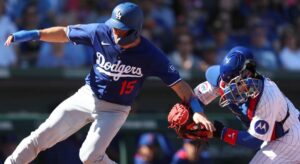Online Betting Editorial: Should Bryce Harper be the National League MVP?
Congrats to @Bharper3407, the #Nats nominee for the 2015 Hank Aaron Award. Vote! http://t.co/NeRtt5ouSd #Bryce4MVP pic.twitter.com/G0OYNjR30T
— Washington Nationals (@Nationals) October 6, 2015
So, should Bryce Harper still be the National League MVP, even though his team ended up cratering? After all, manager Matt Williams and his whole coaching staff were shown the gate as soon as the season ended.
Well, let’s look at the numbers. He came to the plate 654 times in the 2015 regular season. He batted .330 with 42 home runs, 38 doubles and 124 free passes. His WAR (Wins Above Replacement) is a gargantuan 10.1. What does this mean? If you replace him with an average player at his position, the Nationals win 10 fewer games. Can you imagine how badly the Nats would have done with, say, Alex Rios playing his position?
The ballot instructions indicate that the MVP does not need to come from a team that qualifies for the postseason. The ballot also specifies that voters should consider a player’s “actual value” and his “strength of offense and defense.” Two MVP winners have come from last-place teams: Andre Dawson (1987) and Alex Rodriguez (2003). Three other MVPs played for losing teams: Ernie Banks (1958 and 1959) and Cal Ripken (1991). Still two more played for teams that finished right at .500: Hank Sauer (1952) and Robin Yount (1989). Since MLB moved to six divisions in 1994, five more MVPs have come from teams that did not qualify for the postseason: Larry Walker (1997), Barry Bonds (2001 and 2004), Ryan Howard (2006) and Albert Pujols (2008). This means that 37 of the 167 MVP awards have gone to players who did not appear in the playoffs that year, or about 22 percent of all choices.
So on the other hand, that does mean that 78 percent of MVPs have come from teams heading to the playoffs. There could be a selection bias at work here, but this could also mean that most MVPs have been on strong teams. In Harper’s case, the best player toiled for an awful team – but he should still win the trophy.








